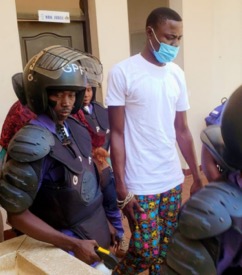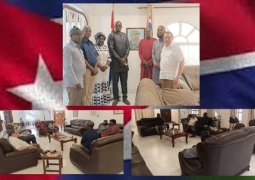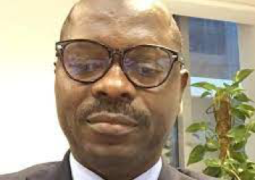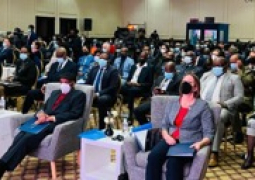
“My Lord, I am making an application for one Omar S. Jallow, a member of The Gambia Armed Forces (GAF), to come forward and testify. Mr Jallow was listed as a witness for the State but has not yet testified. He has provided a statement to the police regarding the PIU shooting incident, in which he is an eyewitness. Therefore, we request that he be called to give evidence as a defence witness,” Counsel Darboe submitted.
In his ruling, the presiding Judge Justice Jaiteh said: “This court has given careful consideration to the application made by learned defence counsel Lamin J. Darboe, on behalf of the 1st accused person, praying the court to issue a subpoena for the appearance of Mr. Omar S. Jallow, a military officer of The Gambia Armed Force attached to the GAF training school, as defence witness.”
“Mr. Jallow is a person of material interest in these proceedings, having provided a signed witness statement to the Gambia Police Force on the 14th of September 2023 in connection with this matter. Although he is listed as a prosecution witness, the prosecution has chosen not to call him. The defence now seeks to rely on his testimony in the presentation of their case.”
“The DPP and counsel for the 2nd accused person Mr. A. Sillah, did not oppose the application. I have reviewed the Bill of Indictment and the statement in question, and I am satisfied that the prospective witness may provide relevant evidence capable of assisting the court in its determination of the truth.”
“The right of an accused person to call and examine witnesses in their defence is not only a foundational principle of our domestic legal system, but also a constitutional guaranteed right. Section 24 (3) (d) of the 1997 Constitution of the Republic of The Gambia provides that every person charged with a criminal offence shall have the right “to obtain the attendance and carry out the examination of witnesses to testify on his or her behalf under the same conditions as witnesses called by the prosecution.”
“Furthermore, Article 7 (1) (c) of the African Charter on Human and Peoples’ Rights, to which The Gambia is a State party, affirms the right to a fair hearing, including the right to defence. Similarly, the ECOWAS Protocol on Democracy and Good Governance (2001) calls on members states to ensure judicial independence and uphold the rights of the accused, including the rights to present evidence in one’s defence.”
“At the international level, Article 14 of the International Covenant on Civil and Political Right, (ICCPR), ratified by The Gambia, reinforces the accused’s right to obtain the attendance and examination of witnesses on his behalf under the same conditions as witnesses against him.”
“To deny an accused person the opportunity to call a relevant witness who has already given a statement to the authorities-absent any legal bar or prejudice-would be to undermine these fundamental safeguards and compromises the fairness of the proceedings.”
Accordingly, and in the interest of justice, I am satisfied that the application is meritorious and ought to be granted.
The presiding Judge therefore ordered pursuant to Section 123 of the Criminal Procedure Code. It is hereby ordered as follow.
- That Mr. Omar S. Jallow, a military officer of the GAF attached to the GAF training school, is hereby commanded in the name of the Republic of The Gambia to appear before this Honourable Court 7th July 2025 at 2:15 p.m. and give truthful testimony on all matters within his knowledge relating to this case, and to remain present until lawfully discharged by the court.
- That the Chief of Defence Staff of the GAF shall be duly served with this order and is hereby directed to ensure that officer Omar S. Jallow appears before this court and complies with this directive without obstruction or delay.
The Judge said failure or neglect by Mr. Omar S. Jallow to comply with this lawful order of the court shall constitute contempt of court, punishable by sanctions including, but not limited to, a term of imprisonments as provided by laws.
Meanwhile, continuing his testimony yesterday, the National Security Adviser, Abubacarr S. Jeng, was asked by defence counsel L. Darboe whether he (Jeng) had participated in a question-and-answer session following his statement at the press briefing held at the Police Headquarters in Banjul. The witness replied in the affirmative.
“You said Ousainou admitted to obtaining his weapon from Cassamance. Was this confession presented to you in audio or video format?” Counsel Darboe asked. In response, the witness stated that the information had been provided verbally, as it was part of an intelligence briefing.
“When the preliminary investigation was concluded, did you ask to verify whether Ousainou’s confession had been recorded in audio or video?” Darboe queried. Jeng replied in the negative.
“Did you see the gun allegedly used by Ousainou Bojang?” Darboe pressed further. The witness replied in the affirmative.
During cross-examination by Counsel A. Sillah, the witness was asked whether it was correct that his role included a supervisory capacity over all security institutions in the country. Jeng answered in the affirmative, adding, “Part of my role involves coordination.”
“Do you know whether forensic analysis was conducted to match the firearm to its user?” Sillah asked. The witness responded, “I don’t know.”
“Were you aware of any female suspect among those arrested?” asked Counsel for the second accused. The National Security Adviser responded, “I am not aware of that. I only saw her here on Tuesday.”




